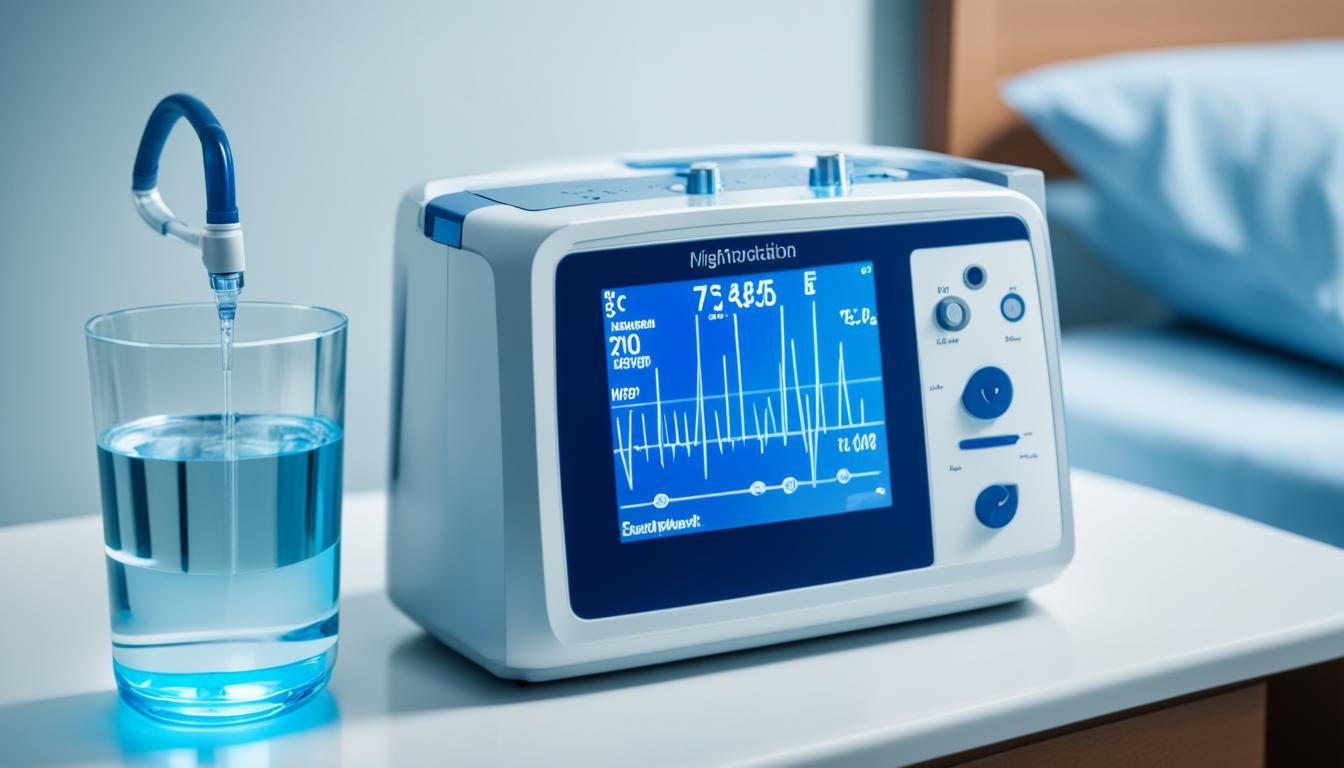Do you know that atrial fibrillation signs can get worse at night? If you feel your heart beats weird or can’t settle down at sleep time, it might be atrial fibrillation. In this piece, we will look at usual night-time signs of atrial fibrillation. We will see how they affect how well you sleep.
Key Takeaways:
- Atrial fibrillation symptoms can worsen during the night, leading to palpitations and restlessness.
- Understanding the specific symptoms of atrial fibrillation at night is crucial for proper diagnosis and treatment.
- Seeking medical evaluation and working with your healthcare team can help manage these nighttime symptoms effectively.
- Lifestyle changes, medication, and other treatments are available to alleviate and improve sleep quality with atrial fibrillation.
- Regular follow-ups and monitoring play a vital role in optimizing your treatment plan and overall symptom management.
A Brief Overview of Atrial Fibrillation
To understand night symptoms of atrial fibrillation, let’s start with an overview. Atrial fibrillation is a heart rhythm issue. It’s marked by a fast and uneven heartbeat. This happens when heart signals in the upper chambers get messy. Then, the heart doesn’t beat right. This bad rhythm can make sleeping hard.
During this condition, the heart’s upper parts don’t squeeze blood out right. So, blood might stay put and get clotty. A brain stroke can happen if a clot moves to the brain. This shows why managing atrial fibrillation well is key.
This image shows the heart beating oddly in atrial fibrillation.
Common Symptoms of Atrial Fibrillation
Let’s start by knowing the usual symptoms of atrial fibrillation. This knowledge helps you grasp how they affect you.
There are many ways atrial fibrillation can show itself. Yet, some symptoms are more common than others:
- Palpitations: You may feel your heart race, flutter, or pound. It seems like it skips or goes too fast.
- Shortness of breath: Breathing can be hard. You might feel out of breath easily.
- Fatigue: You may feel very tired. This happens even if you rest well.
- Dizziness: You might feel light-headed. Or feel like you’re going to fall over.
- Chest pain: Chest discomfort or pressure may occur. If you have chest pain, see a doctor. It can be serious.
These symptoms can happen any time, but night time is often worse. Knowing them helps you deal with atrial fibrillation better.
How Atrial Fibrillation Symptoms Manifest at Night
Atrial fibrillation symptoms can feel different at night. Some people may feel their heart beat faster when they lie down. Others might find it hard to sleep or wake up often due to nighttime manifestations of atrial fibrillation symptoms.
Atrial fibrillation can mess up your sleep. At night, you might notice your heart beating oddly because it’s quiet. This can make you feel uneasy from atrial fibrillation symptoms at night.
The odd beat of your heart can make you restless. It might make it hard for you to fall asleep. Waking up a lot can also happen. This makes it tough to get good sleep.
It’s key to notice these signs at night. They can help doctors understand and manage your condition. Talking to a healthcare provider about what you feel can help. They can find ways to make your sleep and health better.

Understanding the Impact of Atrial Fibrillation Symptoms on Sleep Quality
Having atrial fibrillation at night can mess up your sleep. You might deal with fast heartbeats, feeling restless, and waking up a lot. This can break up your sleep, making you tired during the day. It can also make it hard to focus and think clearly.
Bad sleep can make other health problems worse. It can also raise your risk for heart issues. So, it’s very important to take care of atrial fibrillation at night. Finding good ways to manage it can help you sleep better and take care of your heart.
The Impact of Atrial Fibrillation Symptoms on Sleep Quality
Atrial fibrillation symptoms at night can mess up your sleep. They can make your overall sleep quality bad. Awakenings due to palpitations or discomfort can cause daytime tiredness. They can also make you less focused and productive. It’s key to know how these sleep problems from atrial fibrillation symptoms hurt your well-being and day-to-day life.
When atrial fibrillation symptoms happen at night, they can interrupt your sleep. This prevents you from getting deep, restful sleep. Irregular heartbeats and other symptoms can wake you up suddenly. You might gasp for breath or feel restless. These night issues can mess up your natural sleep cycle. You end up feeling groggy and tired all day.
Daytime Fatigue and Decreased Concentration
One big result of sleep problems from atrial fibrillation symptoms is feeling tired in the day. Not getting enough rest makes you feel tired all day. This tiredness hurts your body and mind. It makes it hard to do daily stuff and pay attention.
“I always feel tired during the day. It’s hard to focus at work or have fun with my family. It all comes from not sleeping well because of my atrial fibrillation symptoms at night.” – Jane, a patient with atrial fibrillation
Also, sleep problems from atrial fibrillation can make it hard to concentrate. Poor sleep hurts your thinking. It’s harder to remember things and solve problems. This can affect your work, friendships, and how happy you are with life.
Reduced Productivity and Emotional Well-being
Bad sleep quality from atrial fibrillation symptoms really affects your productivity. Being tired all the time makes it hard to do your best. It hurts your work and personal goals.
Also, sleep problems can make you feel unhappy and stressed. Always being tired and upset because of atrial fibrillation symptoms can make you snappy. It can even make you feel very down or anxious.
Seeking Appropriate Management and Treatment
Knowing how atrial fibrillation symptoms affect sleep shows why treatment is needed. Talk to your doctor for a plan to handle your symptoms and sleep better. The aim is to lessen the symptoms. This helps you sleep better and improves your overall happiness.
Identifying Atrial Fibrillation Symptoms at Night
Noticing symptoms of atrial fibrillation at night is important. It helps you understand your condition better. By focusing on your experiences while sleeping, you can learn about your symptoms. These symptoms may be linked to atrial fibrillation.
At night, watch for irregular heartbeats. They might feel fast or like fluttering in your chest. Chest discomfort, like pressure or pain, can be a sign. Waking up suddenly without a reason is also important to note.
Making a sleep diary is a good idea. It helps you see patterns in your symptoms. Write down when symptoms happen and how strong they are. Sharing this with your doctor can be really helpful.
Remember, everyone’s experience with atrial fibrillation symptoms at night can be unique. The key is to be attentive and aware of any irregularities or discomfort during your nighttime experiences.
Benefits of Identifying Symptoms at Night
Finding out about atrial fibrillation symptoms at night is key for many reasons:
- Early detection: Spotting signs of atrial fibrillation during sleep can help find the condition early.
- Tailored treatment plans: Knowing your specific symptoms at night helps doctors make special treatment plans for you.
- Improved quality of life: Addressing these symptoms can make your sleep and life better.
Next Steps
If you think your sleep symptoms are due to atrial fibrillation, see a doctor. They will check you well. This check may include an ECG and other tests. These are to confirm your condition and figure out the best treatment for you.
Seeking Medical Evaluation for Atrial Fibrillation Symptoms at Night
If you think you have atrial fibrillation at night, see a doctor. They can check you over. This may include looking at your health history and doing tests. These help them figure out why you have symptoms at night.
Talking to a doctor is key for dealing with atrial fibrillation. They know how to look at your situation. And they can suggest what to do for your nighttime symptoms.
A doctor will talk to you about how you feel. You should be ready to explain your symptoms. Also, tell them how strong these feelings are and what makes them worse. This info helps them understand your condition better.
Don’t try to figure it out yourself. Only a doctor can really know if atrial fibrillation is your problem. Getting a medical check is important for handling your nighttime symptoms the right way.
In an exam, a doctor will listen to your heart. They check if your heart rhythm is odd and listen for strange heart sounds. They also look for signs that could point to atrial fibrillation. This helps them learn more about your condition.
After looking at your health history and examining you, your doctor might need more tests. Tests like an ECG, echocardiogram, or blood tests might be needed. They help confirm if you have atrial fibrillation and how serious it is.
Getting fully checked by a doctor helps you understand your health better. Knowing what’s going on early can help avoid worse problems. It also makes your life better by finding the right way to handle your symptoms at night.

Treatment Approaches
The right treatment for your nighttime atrial fibrillation symptoms depends on a few things. Like how serious your condition is and what you want out of treatment. There are different ways to help.
- Lifestyle modifications: Being healthier, like less stress and caffeine, and more exercise, can make you feel better.
- Medications: Your doctor might give you medicine to help your heart work right. Always take it as told and talk about any side effects.
- Invasive procedures: Sometimes, you might need a procedure to fix heart issues. This can include getting rid of bad heart tissue or getting a device to help your heart beat right.
Your doctor will help figure out the best plan for you. This plan will fit your health needs and what you want.
| Treatment Approach | Description |
|---|---|
| Lifestyle modifications | Making healthy changes such as stress reduction and regular physical activity |
| Medications | Prescribed medications to control heart rate, regulate heart rhythm, or reduce clotting risk |
| Invasive procedures | Catheter ablation or implantation of pacemaker or ICD |
Managing Atrial Fibrillation Symptoms at Night
There’s no cure for atrial fibrillation, but you can manage it. Use strategies to sleep better and feel better overall. Work with your doctors to plan how to manage your symptoms.
1. Lifestyle Modifications:
Change your lifestyle to control atrial fibrillation at night. Stay active, eat well, limit caffeine and alcohol, and reduce stress.
2. Medication:
Your doctor may give you medicine for atrial fibrillation symptoms at night. The medicine can control your heart and improve your sleep.
3. Stress Reduction Techniques:
Stress can make atrial fibrillation symptoms worse at night. Try yoga, mindfulness, or relaxation to sleep better.
4. Sleep Hygiene Practices:
Good sleep habits can help you sleep better, even with atrial fibrillation. Make your bedroom calm, keep a regular sleep time, and avoid screens before bed.
5. Supportive Therapies:
Other treatments like acupuncture or biofeedback might help, too. They can lower stress and improve your sleep at night.
Remember, atrial fibrillation affects people differently. Always work with your healthcare team for a plan that’s right for you. With the right approach, you can handle atrial fibrillation at night and live better.
| Management Strategies | Description |
|---|---|
| Lifestyle Modifications | Incorporate regular physical activity, maintain a healthy diet, limit caffeine and alcohol consumption, and practice stress reduction techniques. |
| Medication | Your healthcare provider may prescribe medications to control heart rate and rhythm, reduce the frequency and intensity of palpitations, and improve sleep quality. |
| Stress Reduction Techniques | Explore stress reduction techniques such as yoga, mindfulness, and relaxation exercises to calm the mind and promote better sleep. |
| Sleep Hygiene Practices | Create a calming sleep environment, maintain a consistent sleep schedule, and avoid stimulating activities or devices close to bedtime. |
| Supportive Therapies | Consider complementary therapies such as acupuncture or biofeedback to reduce stress, improve well-being, and potentially alleviate nighttime symptoms. |
Lifestyle Changes to Support Sleep with Atrial Fibrillation
Having atrial fibrillation symptoms at night can be tough. But, making some lifestyle changes can really help you sleep better and feel better. Here are some tips to get better sleep even when dealing with atrial fibrillation:
Maintain a Regular Sleep Schedule
Keeping a regular sleep schedule helps a lot. Try to sleep and wake up at the same time every day. Yes, even on weekends. This helps your body’s internal clock and makes sleep better.
Avoid Stimulants Close to Bedtime
Try to cut down on things like caffeine and nicotine at night. They can make it hard to sleep. Choosing decaf drinks and cutting back on nicotine can make a big difference.
Create a Conducive Sleep Environment
Make your bedroom a place that’s good for sleeping. It should be cool, dark, and quiet. Things like blackout curtains, earplugs, or a white noise machine can help. Also, having a comfy mattress, pillow, and sheets can increase your comfort.
Incorporate Relaxation Techniques
Relaxing before bed is very helpful. Try things like deep breathing, meditation, or some gentle stretching. These can help your mind and body relax, reduce stress, and help you sleep better.
Remember, making these lifestyle changes is key for sleeping well with atrial fibrillation. Stick to a regular sleep schedule, avoid things that keep you awake, make your bedroom a peaceful place, and relax before bed. Doing these can really improve how well you sleep and help with atrial fibrillation symptoms at night.
Medications and Treatments for Atrial Fibrillation at Night
Sometimes, changing your lifestyle is not enough. You may need medicines or treatments for atrial fibrillation symptoms at night. These help you feel better, sleep well, and avoid problems from atrial fibrillation at night.
Common Medications for Atrial Fibrillation
Your doctor can give you medicines to control your heart’s irregular rhythm and symptoms at night. They might prescribe:
- Antiarrhythmics: These drugs can help restore and maintain a regular heart rhythm.
- Beta blockers: These medications slow down the heart rate and reduce palpitations.
- Calcium channel blockers: These drugs relax and widen blood vessels, reducing strain on the heart.
- Anticoagulants: These medications help prevent blood clots, which can be a concern with atrial fibrillation.
The right medicine and dose depend on your health and symptom severity. Your healthcare provider will choose the best one for you.
Potential Side Effects
Medicines for atrial fibrillation can have side effects. The effects depend on the drug. Common side effects include:
- Dizziness or lightheadedness
- Fatigue
- Headache
- Upset stomach
- Low blood pressure
Talk to your healthcare provider about side effects. Tell them if you have unusual or severe symptoms.
Other Treatment Options
Besides medicines, other treatments can help with atrial fibrillation at night. Some options are:
- Cardioversion: This procedure uses electrical shocks or medications to restore a normal heart rhythm.
- Ablation: Ablation is a minimally invasive procedure that aims to destroy the abnormal heart tissue responsible for the irregular rhythm.
- Implantable devices: Devices such as pacemakers or implantable cardioverter-defibrillators (ICDs) may be recommended to help regulate the heart’s rhythm.
These treatments are chosen based on your needs. They might be combined with medicines or other therapies.
| Medication/Treatment | Description |
|---|---|
| Antiarrhythmics | These drugs help restore and maintain a regular heart rhythm, reducing symptoms experienced at night. |
| Beta blockers | These medications slow down the heart rate, alleviating palpitations and supporting better sleep quality. |
| Calcium channel blockers | By relaxing and widening blood vessels, these drugs reduce strain on the heart and improve nighttime symptoms. |
| Anticoagulants | These medications help prevent blood clots, reducing the risk of complications associated with atrial fibrillation at night. |
| Cardioversion | This procedure uses electrical shocks or medications to restore a normal heart rhythm, enhancing sleep quality. |
| Ablation | Ablation aims to destroy the abnormal heart tissue responsible for irregular rhythm, improving nighttime symptoms and overall quality of life. |
| Implantable devices | Pacemakers or implantable cardioverter-defibrillators (ICDs) may be recommended to regulate heart rhythm and prevent disturbances that occur at night. |
The Importance of Regular Follow-Ups and Monitoring
Atrial fibrillation is a condition that needs ongoing care. It’s important to check in regularly with your doctor.
This helps control symptoms, especially at night. You can improve your health this way.
The Value of Regular Follow-Ups
Seeing your doctor often is key to handling atrial fibrillation. These visits help your team check how you’re doing.
They can change your treatment if needed. Talk about any new symptoms you have.
Your doctor will check you and might run tests. This helps them understand how to best help you.
Make sure to go to your appointments. Always talk openly with your doctor.
Embracing Self-Monitoring Techniques
Self-monitoring is also helpful. Keeping track of your symptoms gives your doctor important info.
Devices like heart rate monitors can be a big help. They track your heart and note any changes.
Using these gadgets can keep you updated on your health. Tell your doctor if something seems off.
Optimizing Symptom Management
Regular check-ups help manage atrial fibrillation symptoms. Your health team can tweak your treatment for the best results.
Partner with your doctor for better symptom management. Adding healthy habits can also improve your life.
Managing atrial fibrillation is a team effort. Stay on top of check-ups and healthy living for a better life.
Conclusion
Having atrial fibrillation at night can mess up your sleep. It can make you feel bad in many ways. It’s key to know these signs and deal with them.
It helps to see a doctor and talk about what you’re feeling at night. Working with your doctor is important to figure out why this happens.
You can try to sleep better by keeping a regular bedtime. Also, try calming down before bed. You might need medicine or other help from a doctor to handle your symptoms better.
Seeing your doctor often is a must to check if your treatment works well. Stay in touch with your healthcare team. Keep an eye on how you feel. Maybe use a smart device if your doctor says so. This way, you can take care of your condition better and sleep well.

